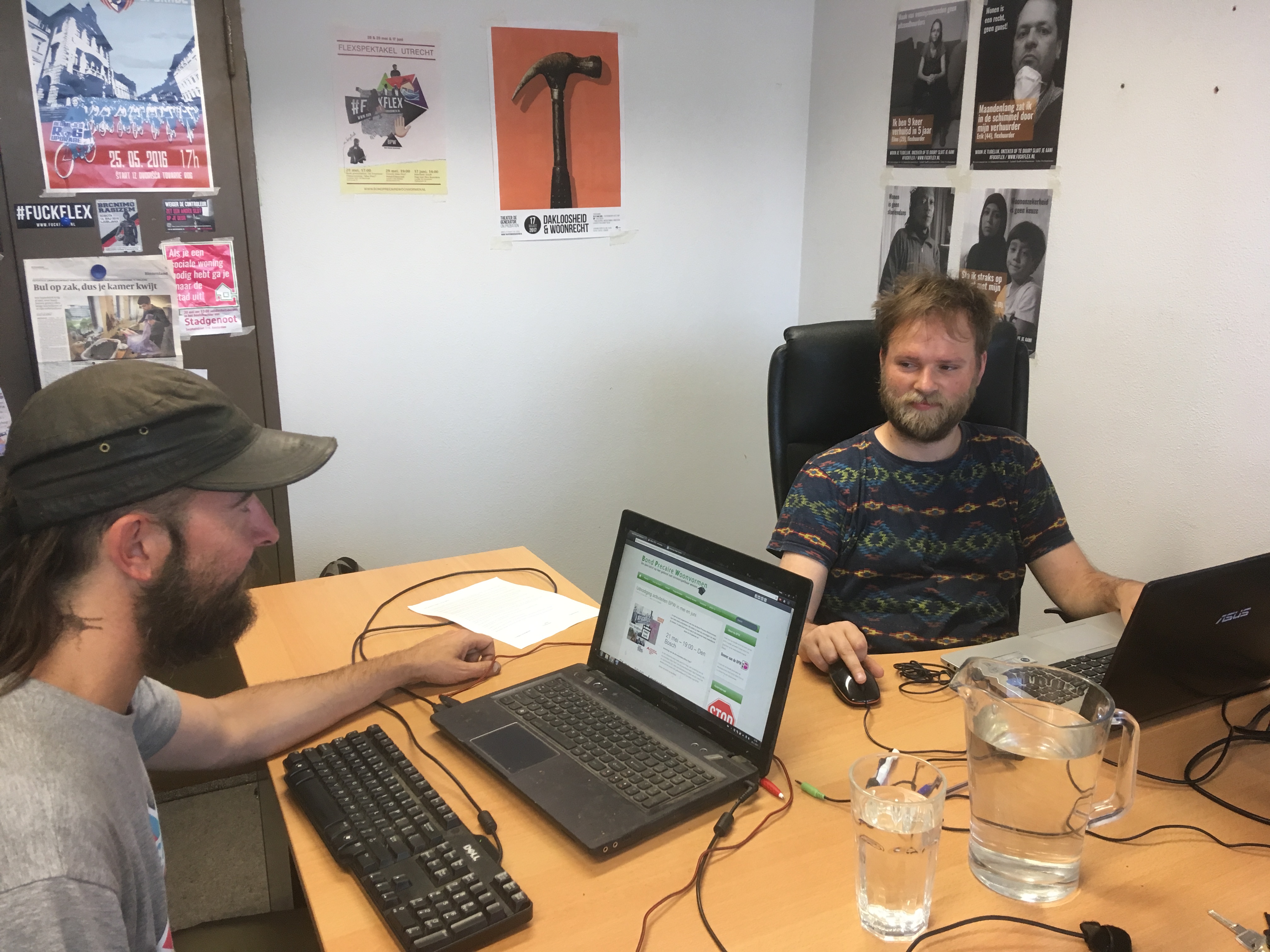
19 June 2017
A great social housing scandal
What is your background and what is your relation to social housing?
I was born in Borculo in the east of the Netherlands, and currently I live in ‘s-Hertogenbosch in the south. I studied free arts (sculpture) in the art academy in Den Bosch and Ljubljana (Slovenija) and graduated in 2007. After graduation I started producing and directing documentary films. I have been active in the housing justice movement for a long time. Good housing for all is really crucial for an equal and open society.
You made a documentary on flexibility in the housing market, called ‘Alles Flex?’ (English: ‘everything flexible’, what is it about?
The documentary is about the erosion of rental rights. This goes at such a high and alarming speed! We have to ask ourselves: what type of society do we get when both work and housing are being flexibilized? We have to look deeper into the rapid flexibilization of renting that is taking place in the Netherland. How does this it effect our existential security?
When did you decide to make ‘Alles Flex’?
Being confronted with people that are excluded from social housing everyday, one realizes the deep value social housing has for society. Flexibilization of rent is being hailed to keep the housing market moving and shrink the social housing stock. It was proposed some years ago by housing Minister Blok and others before. But renters themselves weren’t of the decision-making, nor the public debate. This annoyed me very much. As flexibilization of our lives affect our lives hugely I decided to make a film. To show the problems of this “All Flex” (everything flexible) ideology.
You also started the ‘Bond Precaire Woonvormen’, a union for people in precarious living conditions. What is this union? How does it work?
We started BPW in May 2010 after I made another film Leegstand Zonder Zorgen (2009) (Carefree Vacant Property), when the government proposed anti-squat housing/property guardian companies as a proper way to deal with vacancy. This was the political legitimization of housing without renting protection, circumventing key basic rights for tenants. It was one more step in the rapid erosion of our housing rights. After the film was published, loads of tenants contacted me asking for help.
I decided to start the union for the precariously housed together with others and tenants involved. We want a legal prohibition of these property guardian companies as they horrifically exploit the status of home seekers, that may formally not call themselves tenants. see more info here
Now, 7 Years later, the union has grown rapidly. We are organizing all tenants in the Netherlands that live either temporary, precarious or overpriced accommodation in an emancipatory struggle for decent affordable and permanent housing for all. Our social movement works with volunteers. We try to set up local solidarity networks combating the housing crisis and to assist individual (flexibilized) tenants as well. Soon we will present a new campaign called #fuckflex aiming to further organize the movement against precarity (in work and housing) and for housing justice.
We are part of the european coalition for the right to housing and the city.
What motivates you to advocate for housing rights?
We are confronted with so much housing inequality it is shocking! Over 25% of (social) renters live under the poverty level. Waiting lists are on average 8 years in the Netherlands. The social housing sector shrank by 262,000 from 2010 to 2016 due to demolition, liberalization and property sale; rents increased 28.8% in the last 6 years; household expenditure doubled on rents since the 70s. Over 10 forms of flexibilised tenancies with fewer rights emerged. These ‘flex’ tenants are evicted and dropped on the streets without rehousing rights. Landlord and politicians claim these people ‘choose’ to live precariously, and thus should suffer the risks. People are forced to move 9 times in 5 years. People have their privacy rights violated. Displacement means poor people thrown out of houses and cities. And much much more… It’s a great (social) housing scandal!
Housing should be a human right. If people are excluded they cannot function properly in society either work, community, relations, study etc. Such a basic right should not be left to the speculative housing market. Being confronted with housing injustice every day. We have to fight back together against precarization of housing. I enjoy it when people are happy to be assisted and join our movement. By doing this I hope to contribute to a more equal and compassionate society where people are (more) in control of their living situation.
Why do you believe flexible contracts can be detrimental, and what is your ideal, alternative social housing situation?
If people are being confronted with too much insecurity on all levels of society, it is very bad for the well-being of people. Flexible and precarious contracts can be terminated more easily, and tenants have no rights to moving-cost compensation nor alternative housing. Having to move without knowing where you will go is very stressful, often leading to people signing up for precarious housing, again…. It’s all class relations. There are a group of people we call flexnomads. Meanwhile we face an ever shrinking social housing sector. If next to the precarised labor market, where 1/3 works in temporary employment earning on average 35% less than those on permanent contracts, also housing becomes part of this neo-liberal doctrine of flexibilsation of all aspects of life. How can one build up a life?
Flexibilisation is not the answer to growing scarcity. Investment in social housing is. But the government chooses to tax social housing corporation (the verhuurdersheffing that amounts to €1.7bn) instead of funding them.
With flexibilisation of housing, the idea that social housing is only a temporary phase is accepted. This means that policy makers could begin to see their destructive and divisive policies as vindicated, and social housing advocates will face an even more uphill struggle.
With increasing wage stagnation and flexibilised jobs, with their smaller wages, the idea of upward mobility out of social housing towards expensive and temporary market rents is really dangerous. Also if you earn less and work precariously you have the right to live in the city.
This residualisation of social housing combined with flexibilisation is undermining the goal social housing corporations: providing decent long-term affordable housing for all; and that includes the middle class!
But since privatisation in the early 90’s the amount of social housing nationally went down from 44% to 30% currently. By excluding the middle class the housing solidarity with the working class is broken, leaving a precarious group in uncertain smaller and temporary housing. The middle class itself is better off in housing corporations with longterm and affordable rents instead of the so called free-sector rents that are expensive and increasingly precarious and temporary. We therefore need a large-scale non profit social housing stock for all.
Flexibilisation is an attack on everybody that cannot or doesn’t want to buy. It’s the erosion of our social right to stay in a place permanently. Towards a model of permanent transience. If a stable place to live becomes a privilege it is time to change the model.




Comments